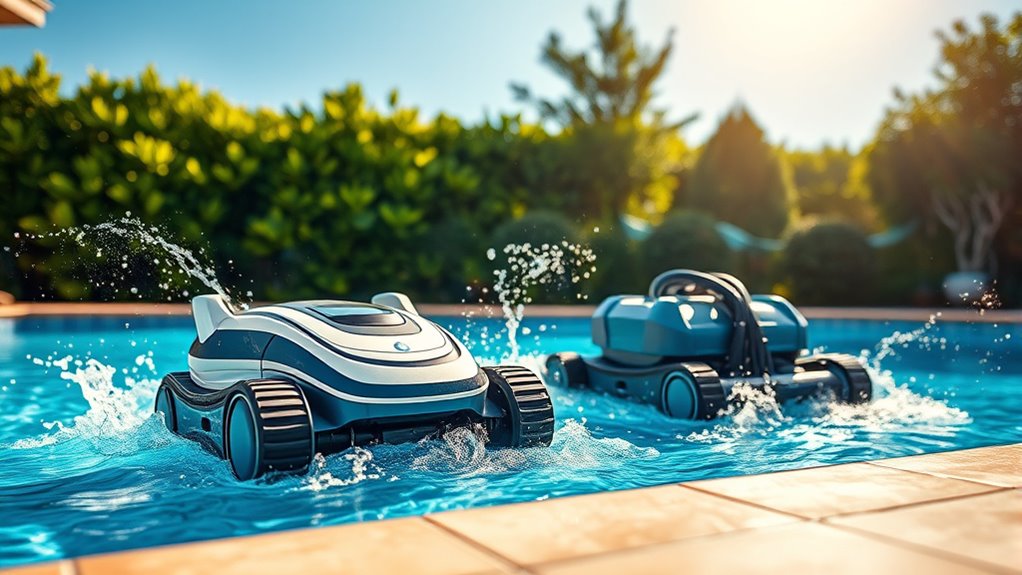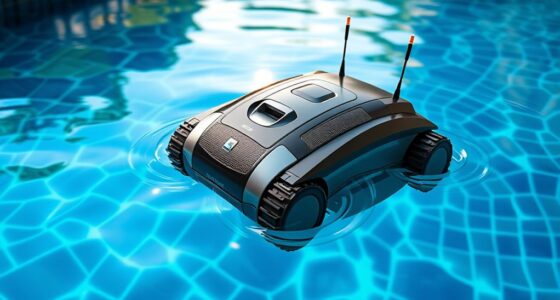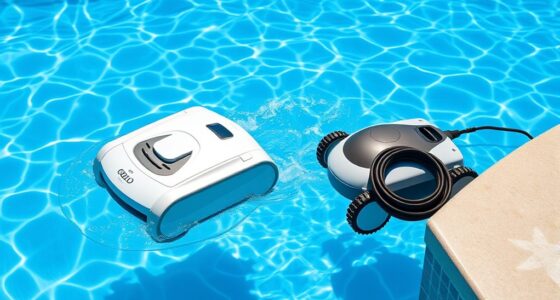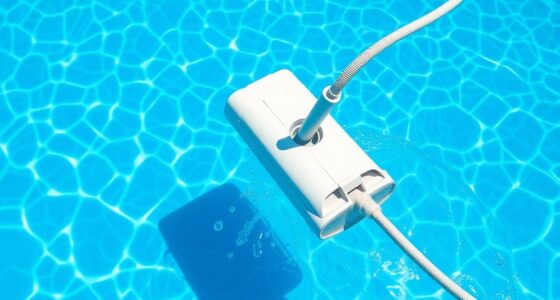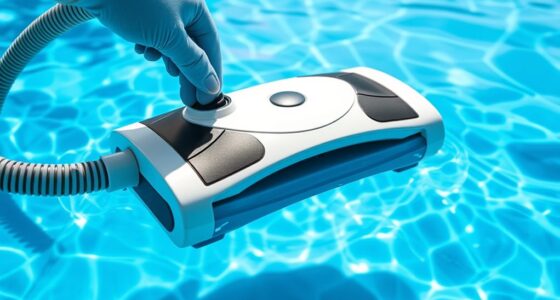When comparing pressure pool cleaners, you’ll find that energy efficiency varies based on features like pump type, size, and power source. Modern models with variable-speed pumps and adjustable cycles use less energy, especially when paired with solar power options. Traditional cleaners tend to consume more energy, but eco-friendly designs can reduce environmental impact. To make the best choice, consider those with smart technology and renewable energy integrations—there’s plenty more to explore if you keep looking.
Key Takeaways
- Solar-powered pressure cleaners eliminate grid electricity reliance, significantly reducing energy consumption and operational costs.
- Variable-speed pumps optimize water flow and cycle durations, enhancing energy efficiency during cleaning routines.
- Eco-efficient models are designed to minimize power use while maintaining effective cleaning performance.
- Integrating renewable energy sources and smart technology allows for tailored, sustainable pool cleaning operations.
- Proper selection and setup of energy-efficient pumps and solar options can substantially lower a pressure cleaner’s environmental footprint.
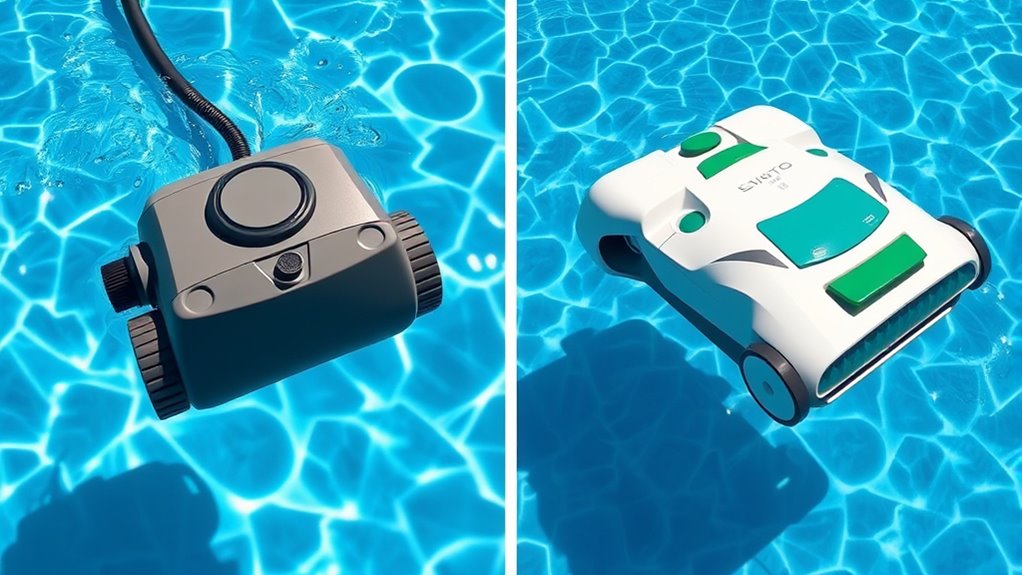
Are pressure pool cleaners the right choice for keeping your pool spotless? When considering energy use and efficiency, it’s important to weigh how these cleaners operate and how they fit into your eco-friendly goals. Pressure pool cleaners typically use a dedicated booster pump that runs off your pool’s existing filtration system, which means they rely heavily on your pool’s power supply. This can lead to higher energy consumption, especially if the pump runs frequently or is not energy-efficient. However, some newer models are designed to optimize water flow and minimize energy waste, helping you conserve power while maintaining a clean pool.
One way to improve energy efficiency is by integrating solar power solutions. Solar-powered booster pumps can drive pressure pool cleaners without drawing electricity from your main power grid, markedly reducing your energy footprint. By harnessing the sun’s free energy, you not only cut down on electricity bills but also promote energy conservation. Installing solar panels dedicated to powering your pool’s cleaning system allows you to run your pressure cleaner during the day when the sun is shining, ensuring your pool gets cleaned without unnecessary energy expenditure. This setup is especially appealing if you’re committed to eco-friendly practices, as it converts a typically power-hungry process into a sustainable one.
In addition to solar power, modern pressure pool cleaners often come with features designed to maximize efficiency. For example, some models have adjustable cleaning cycles or variable-speed pumps that allow you to control how much energy you use. Running the cleaner for shorter periods or during off-peak hours can make a noticeable difference in overall energy consumption. Plus, choosing an energy-efficient pump or a model that’s compatible with variable-speed technology ensures you’re not wasting power when it’s not needed. Energy-efficient pumps are a crucial component in reducing overall power usage and improving sustainability. Incorporating smart technology into your cleaning system can further optimize energy use by adjusting cleaning patterns based on your pool’s specific needs. Additionally, selecting a model with low energy consumption can significantly contribute to reducing your environmental impact.
While traditional pressure cleaners can be quite energy-intensive, the trend is moving toward smarter, more sustainable options. If you’re serious about energy conservation, look for models that are explicitly designed with eco-efficiency in mind. Pairing these with solar power solutions maximizes your pool’s cleanliness while minimizing environmental impact. Remember, the key is balancing effective cleaning with mindful energy use, so your pool stays pristine without draining unnecessary resources. Incorporating renewable energy sources into your pool maintenance can significantly reduce your overall energy consumption, making your cleaning routine more sustainable. With the right setup, pressure pool cleaners can be an efficient, eco-friendly part of your pool maintenance routine.
Frequently Asked Questions
How Does Energy Consumption Vary Between Different Pressure Pool Cleaner Models?
You’ll notice that energy consumption varies among pressure pool cleaner models. More efficient models use less power, thanks to better battery efficiency and optimized motor design. Lower noise levels often indicate less energy waste, so quieter cleaners tend to be more efficient. When choosing a cleaner, consider these factors—battery efficiency and noise levels—to find one that minimizes energy use while performing effectively.
What Maintenance Practices Optimize Pressure Cleaner Energy Efficiency?
Imagine you’re optimizing your pressure pool cleaner’s energy efficiency. Regularly cleaning or replacing filters guarantees smooth operation, reducing strain on the motor. Conducting periodic energy audits helps identify inefficiencies. For example, installing solar panels can supplement power, decreasing energy consumption. These practices, combined with routine maintenance, keep your cleaner running efficiently, saving you money and extending its lifespan. Proper upkeep is key to maximizing energy use and efficiency.
Are There Eco-Friendly Pressure Pool Cleaners Available?
Yes, eco-friendly pressure pool cleaners are available. You can find models with solar compatibility, which harness solar energy to reduce electricity use, or battery-powered options that eliminate cord clutter and lower energy consumption. These cleaners are designed to be more sustainable, helping you keep your pool clean while minimizing environmental impact. Look for options with energy-efficient features and eco-friendly certifications to guarantee you’re making a greener choice.
How Does Water Pressure Impact the Cleaning Performance?
Think of water pressure like the beating heart of your cleaner; it drives the entire operation. You’ll notice that higher water flow, influenced by nozzle design, boosts cleaning power by dislodging dirt more effectively. But too much pressure can cause splashing or damage, so finding the right balance is key. Proper nozzle design ensures ideal water flow, helping your cleaner perform at its best without wasting energy or causing unnecessary wear.
Can Pressure Pool Cleaners Be Integrated With Smart Home Systems?
You can integrate pressure pool cleaners with smart home systems, but compatibility issues might arise. Check if your cleaner supports smart home integration through apps or compatible hubs. If it does, you can control it remotely and automate cleaning schedules. However, some models may not be compatible, so confirm your cleaner and smart system work together to avoid frustration. Always verify compatibility before purchasing to enjoy seamless control.
Conclusion
While pressure pool cleaners may consume more energy, their robust performance often saves you time and effort. Conversely, energy-efficient models might cost less upfront but could require more manual intervention. Ultimately, weighing power against efficiency helps you find the right balance. Just as a powerful cleaner quickly restores your pool’s sparkle, an energy-conscious choice minimizes ongoing costs. In the end, selecting the right cleaner means matching your priorities—speed and strength or savings and sustainability.
